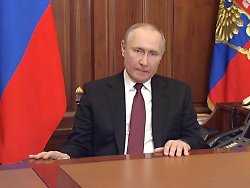The Russians want to rid Ukraine of “Nazis,” and many of them don’t even know what the word even means. The lack of political education is playing into the hands of the Kremlin: 77 years after the horrors of World War II, the Russians are chanting slogans like “We can repeat that” instead of “Never again”. How could it possibly come this far?
In his speech on May 9, “Victory Day,” Vladimir Putin once again spoke of the “Nazis” against whom the Russians are fighting in Ukraine. The Kremlin justified the attack on the neighboring country with an allegedly necessary “denazification”. A few days ago, Russian Foreign Minister Sergey Lavrov caused outrage by claiming that it doesn’t matter that Ukrainian President Volodymyr Zelenskyy is Jewish. Hitler also had “Jewish blood,” Lavrov claimed. In his view, as a rule, Jews themselves are “the most zealous anti-Semites”.
Apparently, people in Russia have a different idea of National Socialism than in the rest of the world. After Lavrov’s interview, Putin’s top propagandist Vladimir Soloviev claimed on state television that Nazism does not necessarily mean anti-Semitism. This statement is of course wrong. National Socialism is a racist, nationalist and anti-Semitic ideology. But Soloviev has a different opinion: “That’s what the Americans keep saying. They say that Zelenskyj is a Jew, so he can’t be a Nazi. Of course he can be one,” said the moderator on his talk show “Abend with Vladimir Soloviev”. “Nazism does not have to be anti-Semitic. It can also be anti-Slavic and anti-Russian. And that is what Ukrainian Nazism is.” A guest of the show, “political scientist” Elena Ponomareva, went further and bemoaned the “anti-Semitism against the Russians, against everything to do with Russia”.
“Never again” becomes “We can do it again!”
The word Nazism has lost its real meaning in today’s Russia. In propaganda rhetoric, it is a synonym for all evil, for the foreign, for the “unfriendly states” and for everyone who is against the conquest of Ukraine. The word also serves to intimidate the population and mobilize society against the supposed enemies. “Putin wants the concept of Nazism, which in Russian minds is associated with the heinous crimes of Nazi Germany in the occupied Soviet territories, to be transferred to today’s Ukraine,” historian Alexei Heistver said in an interview with the “Tagesspiegel”.
The propaganda spreads the myth of Russia as a nation of liberators. For decades, Russians were proud of their ancestors, who liberated Europe from the Nazis 77 years ago. Now they are supposed to believe they are following in their footsteps to “denazify” the world. Instead of “Never again war” all over Russia on May 9 “the cannibalistic slogan ‘We can repeat that!’ called,” says Heistver. “Putin usurped victory over fascism because he has nothing of his own to offer but constant robbery. So you put little kids in military uniforms and have them shout slogans.”
In fact, Russian children are taught at school that their homeland is the most peaceful country in the world, that it has never attacked anyone, but that it has repeatedly had to defend itself against numerous enemies. The history books only marginally mention the war of aggression against Finland in 1939-1940 or the Soviet intervention in Afghanistan. No wonder the slogan “Russia doesn’t start wars, it ends them” is popular among Kremlin supporters these days. And so it comes about that Russians who support the war in Ukraine have no doubt that they are on the right side. They live with the idea that they will be attacked and need to defend themselves, not the other way around.
Defamation of Ukrainians as “Nazis” has a long history
Kremlin propaganda has been discrediting Ukraine as fascist for a long time and not just since the beginning of the large-scale war in February of this year. Ever since the 2004 Orange Revolution, when pro-Western politician Viktor Yushchenko became president, “Russians have been working hard to connect Ukrainian reformers, western Ukrainians and the Ukrainian idea in general with the history of World War II,” said US historian Timothy Snyder 2014 in an interview with the “Frankfurter Allgemeine Zeitung”.
When the pro-Russian President Viktor Yanukovych was deposed in the course of the Maidan revolution in 2014, the Russian media reported that “fascists” had seized power. In their reports, state propaganda drew attention to the fact that the protests included Ukrainian nationalists. These groups played a role, says historian Karl Schlögel, “in part because they campaigned massively against the police brutality of the Yanukovych regime. But to claim that there is a nationalist movement in Ukraine is completely absurd and far-fetched.”
In Ukraine there are individual radical paramilitary groups such as the “Azov” regiment. But neither in the government nor in the army is there widespread support for the far-right ideology. In the 2019 parliamentary elections, ultra-right nationalist parties failed to win a single seat in the 450-seat Verkhovna Rada. In addition, the law “On the Condemnation of Communist and National Socialist Totalitarian Regimes” came into force in 2015. The dissemination of Nazi symbolism and propaganda is thus prohibited.
It’s no secret that in Ukraine – as in Russia and many other countries – there are individual radical right-wing groups that have little or no influence on society. However, there is no reason to blanketly defame the population or the government of Ukraine as “Nazis”. That Putin is doing it anyway is an attempt to legitimize the destruction of peaceful cities and mass killings of civilians in the eyes of Russians.
